Faculty
- PROGRAM FACULTY
- FACULTY BY FIELD
- IGERT PIs
IGERT program faculty include a wide range of senior and junior faculty—from across the natural and social sciences—who are involved in food systems and/or poverty-related research. Program faculty members can either be requested to serve as members of an IGERT Trainee’s Special Committee or they can help prospective Trainees identify potential Special Committee members in the Graduate Fields they represent. We advise all students who are interested in applying for an IGERT Traineeship to first discuss their interest with one of our Program Faculty who represents their Graduate Field(s) of interest.
- Christopher Barrett
- Lawrence Blume
- Kathryn Boor
- Carol Colfer
- Richard Dudley
- John Duxbury
- Parfait Eloundou-Enyegue
- William Fry
- Miguel Gomez
- Robert Howarth
- Karim-Aly Kassam
- Johannes Lehman
- Peter Loucks
- Natalie Mahowald
- Beth Medvecky
- Michael Milgroom
- Stephen Morgan
- Kevin Morrison
- Rebecca Nelson
- Daryl Nydam
- Alice Pell
- David Pelletier
- Per Pinstrup-Andersen
- Alison Power
- Susan Riha
- David Sahn
- Tammo Steenhuis
- Rebecca Stoltzfus
- Alex Travis
- Michael Walter Sr.
- Chris Watkins
- Monroe Weber-Shirk
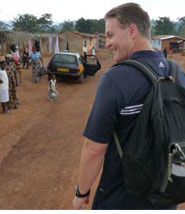
Chris Barrett
315 Warren Hallcbb2@cornell.edu
Member of the following Graduate Fields:
- Applied Economics and Management
- Conservation & Sustainable Development
- Economics
- International Agriculture and Rural Development
- International Development
- Natural Resources
The Food Systems and Poverty Reduction IGERT offers an outstanding opportunity for exceptional, highly-motivated Ph.D. candidates to work together with a large group of us faculty at Cornell to help make progress on the complex problems that cause food systems to underperform their potential, to trap huge numbers of people in persistent poverty, and to degrade the natural environment. I am eager to work with students and faculty who share this passion and a commitment to apply the cutting-edge toolkits from our scientific disciplines to address these scientific and societal challenges.

Larry Blume
Uris Halllb19@cornell.edu
Member of the following Graduate Fields:
- Economics
- Information Science
The study of social systems is inherently interdisciplinary. An economist by training, I have worked with biologists, sociologists and computer scientists. The multidisciplinary approach of the Food Systems and Poverty Reduction IGERT is evident throughout Cornell, and makes the University and Ithaca a very exciting place to be.
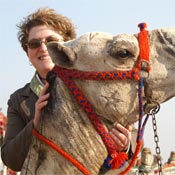
Kathryn Boor
413 Stocking Hallkjb4@cornell.edu
Member of the following Graduate Fields:
- Food Science and Technology
- Microbiology
- Environmental Toxicology
The specific foci of my research program are to identify and characterize factors that affect the presence and persistence of undesirable organisms in food products intended for human consumption. Our strategies integrate the tools of molecular biology and phenotypic microbiology to: (i) explore factors linking the ability of bacteria to survive under various conditions throughout food systems, including in foods and in food processing environments, with bacterial ability to cause human and animal disease; and (ii) rapidly identify and track spoilage and pathogenic bacteria in food systems. One key strategy for strengthening food safety systems and reducing food-borne illnesses is to develop effective food-borne illness surveillance systems to collect, analyze, and share epidemiological data. These data must then be used as a basis for setting priorities on the most critical food-borne risks that need to be addressed in order to realize the highest impact. The data generated by our research team contributes to these ends.
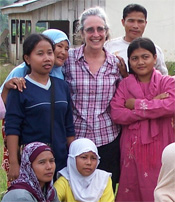
Carol Colfer
Warren Hallc.colfer@cgiar.org
I’m a visiting fellow at the Cornell International Institute for Food, Agriculture and Development, but I’ve also retained my post as Senior Associate and anthropologist with the Center for International Forestry Research (CIFOR) in Bogor, Indonesia. I collaborate with Cornell faculty in the IGERT program on food systems in East Africa, and interact with students, one-on-one, often on issues related to adaptive collaborative management, particularly in Indonesia.
I have many years of ethnographic experience in the Middle East, Southeast Asia, and the United States, as well as global, forest-related experience in criteria and indicators, adaptive collaborative management and governance. My interests include gender and diversity, people and forests, health and population, and conservation and development issues.
This year, I have completed the editing of a book, “Local Governance of Tropical Landscapes,” with Jean-Laurent Pfund (to be published by Earthscan, London); and I am currently working on a survey relating to the perceptions of marginalized people in forests about the rules and regulations under which they live.
For more information, check out my webpage: http://earth01.net/CJPColfer/

Richard Dudley
17 Warren Hallrgd6@cornell.edu
Adjunct Associate Professor
Cornell International Institute for Food Agriculture and Development
I moved back to the USA in 2009 after living and working mostly outside the USA since 1983, most of that time in Indonesia. My training in fisheries led to my work with small-scale fisheries management in marine, estuarine, and fresh waters. My interests and experience also include protected area management and conservation, and marine sciences education. Since 1998 I have been using system dynamics modeling to investigate policy questions related to natural resource management and related international development issues including: fishery management, illegal logging, REDD, corruption, and the problem of dual salary scales on international projects. In addition to my work in Indonesia, I have held long term fishery positions in Oman, Zambia, and Malawi. Prior to much of my international work I held university teaching/research positions in the USA.
For more details see: http://earth01.net/RGDudley/
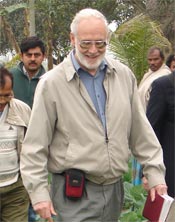
John Duxbury
904 Bradfield Halljmd17@cornell.edu
Member of the following Graduate Field:
- Soil and Crop Sciences
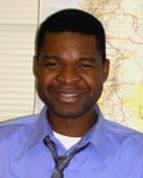
Parfait Eloundou-Enyegue
334 Warren Hallpme7@cornell.edu
Member of the following Graduate Fields:
- Development Sociology
- International Development
- Africana
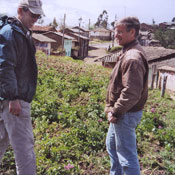
William E. (Bill) Fry
303B Plant Science Bldg.wef1@cornell.edu
Professor of Plant Pathology and Plant-Microbe Biology, International Professor
Shown here (on right) with Greg Forbes (International Potato Center) at a potato field in the Andes of Peru
Member of the following Graduate Field:
- Plant Pathology and Plant-Microbe Biology

Miguel Gomez
246 Warren Hallmig7@cornell.edu
Member of the following Graduate Fields:
- Agricultural Economics
The IGERT program offers a unique opportunity to study the links across supply chain efficiency, sustainability and poverty alleviation. I look forward to exploring the tradeoffs and complementarities between these multiple dimensions influencing the ability of supply chains to integrate small growers to the market.

Bob Howarth
309 Corson Hallhowarth@cornell.edu
Member of the following Graduate Fields:
- Ecology & Evolutionary Biology
- Natural Resources
- Soil and Crop Sciences
- Environmental Quality Engineering
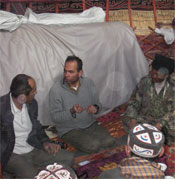
Karim-Aly Kassam, PhD
8A Fernow Hallksk28@cornell.edu
http://www.dnr.cornell.edu/kassam
Member of the following Graduate Fields:
- American Indian Studies
- International Agriculture and Rural Development
- Natural Resources
An unprecedented confluence of issues face humanity at the dawn of the third millennium. While tenuously grappling with dramatic climate change and its socio-cultural and ecological consequences, we simultaneously need to address a structural economic crisis resulting in a global recession, and growing demand for alternative energy sources to sustain food and livelihood security. Despite the fact that these three issues are intimately related, there is no historical model from which to articulate an effective response to the convergence of climate change, economic crisis, and growing energy demands. While my research is primarily in other parts of the globe, these core issues are directly relevant to Africa, where I was born and have family. This Food Systems and Poverty Reduction IGERT offers us the opportunity to work together in developing pragmatic insights and practical approaches to addressing issues of food sovereignty in Africa. I firmly believe that students are not only consumers of information but producers of insight. They change paradigms.
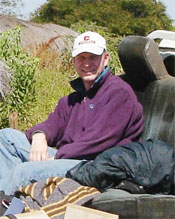
Johannes Lehmann
909 Bradfield Hallcl273@cornell.edu
Member of the following Graduate Fields:
- Soil and Crop Sciences
- International Agriculture and Rural Development
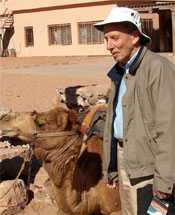
Pete Loucks
311 Hollister HallDPL3@cornell.edu
Member of the following Graduate Fields:
- Civil and Environmental Engineering
- Regional Science
- Public Policy and Administration
- International Development
- Water Resources

Natalie Mahowald, PhD
Snee 2140mahowald@cornell.edu
Member of the following Graduate Fields:
- Atmospheric Sciences
- Geological Sciences
While agriculture in East Africa is focused on producing enough food for the people, it has implications for climate through impacts on emissions of desert dust and green house gases like carbon dioxide, nitrous oxide and methane. In addition, future food production in East Africa will be changed from climate. Thus understanding the big picture of global climate change impacts and mitigation in the context of East Africa will be my contribution for the Food Systems and Poverty Reduction IGERT.
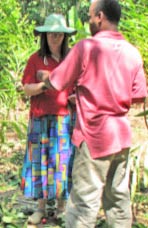
Beth A. Medvecky, PhD
31 Warren Hallbam44@cornell.edu
IGERT Associate Director, CIIFAD Assistant Director
Member of the following Graduate Fields:
- None
I am a Research Associate not a faculty member. This means that I will not be able to serve on anyone’s PhD committee, although all IGERT students will interact with me a lot.
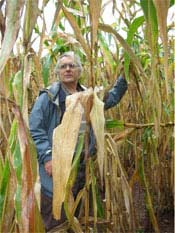
Michael Milgroom
357 Plant Science Buildingmgm5@cornell.edu
Member of the following Graduate Field:
- Plant Pathology & Plant-Microbe Biology

Stephen L. Morgan
358 Uris Hallslm45@cornell.edu
Member of the following Graduate Field:
- Sociology
The substantive foci of the Food Systems and Poverty Reduction IGERT differs somewhat from the topics of my own past research, but I am an avid consumer of the important work of others engaged in this project. I very much enjoy working with students on these topics, and I hope to be able to provide a perspective from sociology and from my own field experiences to the broad training program that Cornell can now offer.

Kevin Morrison
315 White Hallmorrison@cornell.edu
Member of the following Graduate Field:
- Government

Rebecca Nelson
303A Plant Sciencerjn7@cornell.edu
Member of the following Graduate Fields:
- Plant Pathology & Plant-Microbe Biology
- Plant Breeding
- International Agriculture and Rural Development
There’s more to life than fungi, some might say. To engage with larger issues of food security, I also serve as Scientific Director for The McKnight Foundation’s Collaborative Crop Research Program. In this role, I work with diverse colleagues to support research projects in food-insecure regions in Africa and the Andes. I very much look forward to participating in the Food Systems and Poverty Reduction IGERT in a similar spirit.
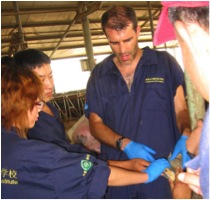
Daryl Nydam
C2 562 Veterinary Medical Centerdvn2@cornell.edu
Member of the following Graduate Fields:
- Animal Science
- Comparative Biomedical Science
- International Agriculture and Rural Development

Alice Pell
115 Day Hallap19@cornell.edu
Member of the following Graduate Fields:
- Animal Science
- International Agriculture and Rural Development
- Microbiology
- Nutrition
- Public Affairs
I am currently serving as Vice Provost of International Relations. While this limits my capacity to serve as a primary faculty advisor to IGERT trainees, I will interact with the group frequently and can serve as a minor member of graduate committees. I am also happy to assist students whose interests overlap with mine to identify potential faculty advisors in the Graduate Fields I represent.
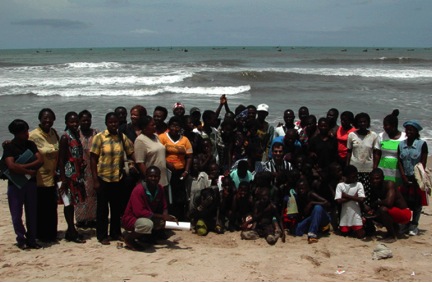
David Pelletier
212 Savage Halldlp5@cornell.edu
Member of the following Graduate Fields:
- Nutrition
- Epidemiology
- Public Affairs
- Anthropology

Per Pinstrup-Andersen
305 Savage Hallpp94@cornell.edu
Member of the following Graduate Fields:
- Nutrition
- Applied Economics and Management
- Cornell Institute for Public Affairs

Alison Power
331 Corson Hallagp4@cornell.edu
Member of the following Graduate Fields:
- Conservation & Sustainable Development
- Ecology & Evolutionary Biology
- Entomology
- International Agriculture and Rural Development
- Latin American Studies
- Science & Technology Studies
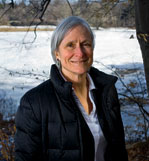
Susan Riha
1110 Bradfield Hallsjr4@cornell.edu
Member of the following Graduate Fields:
- Water Resources
- Soil and Crop Science
- International Agriculture and Rural Development
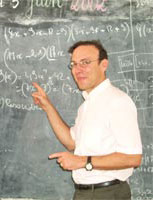
David E. Sahn
B16 MVR Halldes16@cornell.edu
Member of the following Graduate Fields:
- Applied Economics and Management
- Economics
- International Development
- Nutrition
- Policy Analysis and Management
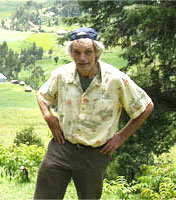
Tammo Steenhuis, PhD
206 Riley Robbtss1@cornell.edu
Member of the following Graduate Fields:
- Biological and Environmental Engineering
- Conservation & Sustainable Development
- Geological Sciences
- International Agriculture and Rural Development
- Soil and Crop Sciences
- Water Resources
Both Ethiopia and Kenya have large areas that are water short and by using the available water more productive, poverty-related problems can be reduced. However, that is only technical part and social and economic issues are just as important for finding solutions that actually might be used by the affected people. I hope you will join us.
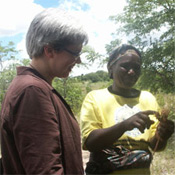
Rebecca (Becky) Stoltzfus, PhD
120 Savage Hallrjs62@cornell.edu
Member of the following Graduate Fields:
- Nutrition
- International Development
The IGERT program offers both faculty and students the opportunity to investigate in new ways the linkages between poverty, the food system, and health and nutrition. I look forward to interdisciplinary thinking about how food system interventions can be leveraged to improve family health and nutrition, and the development of human capital.

Alex Travis
Baker Institute for Animal Healthajt32@cornell.edu
Member of the following Graduate Fields:
- Zoology & Wildlife Conservation
- Molecular and Integrative Physiology
- Comparative Biomedical Sciences
As a veterinarian, I am very interested in how rural people often use livestock as “savings accounts.” In addition to providing draft power and food, livestock can be sold in times of financial stress or food insecurity. Although livestock production can certainly have negative impacts on local environments, sustainable production can have positive impacts, such as lessening the need for poaching for bushmeat sale/consumption. Factors such as nutrition, water, and housing can have dramatic impacts on production. Animal disease can also exert a major influence on rural people, both in terms of the livestock themselves, as well as in terms of their transmission to humans and wildlife (which can then serve as reservoirs). These complex interactions can have dramatic impacts on attempts to conserve wildlife, especially in the context of transnational parks that facilitate the movement of agricultural and wild animals.
As a reproductive biologist, I also run a laboratory that performs basic scientific investigations that can lead to the development of new contraceptive methods. I am also actively engaged in the development of new technologies based on animal stem cells to preserve genetic diversity.

Mike F. Walter
207 Riley Robbmfw2@cornell.edu
Member of the following Graduate Field:
- Biological and Environmental Engineering

Chris Watkins
356 Roberts Hallcbw3@cornell.edu
Member of the following Graduate Fields:
- Food Science and Technology
- Horticulture
I have been involved in overseas research and extension activities in Malawi, Zimbabwe and Serbia, as well as visits to China, Malaysia, India and Chile, and understand many of the challenges that exist for reducing food losses around the world. The IGERT program provides opportunity to link food systems associated with horticulture with other disciplines at Cornell.
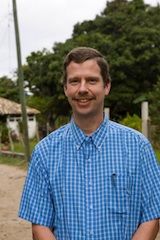
Monroe Weber-Shirk
115 Hollister Hallmw24@cornell.edu
Member of the following Graduate Fields:
- Environmental Engineering
- International Development
I have been teaching environmental engineering at Cornell University since 1994. I currently teach ENGRI 1131: Water Treatment Design, CEE 4540: Sustainable Municipal Drinking Water Treatment and the suite of AguaClara courses CEE 2550, CEE 4550, CEE 5051. I also take approximately 20 students per year on an education immersion experience in Central America with a focus on engineering in a global context
Graduate Fields and the Special Committee
Cornell’s Graduate School is organized into Graduate Fields consisting of groups of faculty who share a common academic interest, regardless of their college or departmental affiliation. All Cornell doctoral students specialize in 1 major Graduate Field of study, with 2 minor subjects within that or other Graduate Fields. Each student is supervised by a Special Committee of three faculty advisors, one each for these Field/Subjects. This Special Committee, which is selected by the student, helps the student to develop their research and academic program and monitors their progress and achievements. The faculty member who represents the student’s major Field of study is considered the Chair of their Special Committee, while those who represent their minor fields are additional Special Committee members.
| Animal Science | Alice Pell |
| Anthropology | |
| Applied Economics and Management | Christopher Barrett Per Pinstrup-Andersen David Sahn |
| Atmospheric Sciences | Natalie Mahowald |
| Biological and Environmental Engineering | Tammo Steenhuis Michael Walter Sr. |
| Civil and Environmental Engineering | Peter Loucks |
| Development Sociology | Parfait Eloundou-Enyegue |
| Ecology & Evolutionary Biology | Robert Howarth Alison Power |
| Economics | Christopher Barrett Lawrence Blume David Sahn |
| Entomology | Alison Power |
| Environmental Toxicology | Kathryn Boor |
| Food Science & Technology | Kathryn Boor Chris Watkins |
| Government | Kevin Morrison |
| Horticulture | Chris Watkins |
| Molecular and Integrative Physiology | Alex Travis |
| Natural Resources | Robert Howarth Karim-Aly Kassam |
| Nutrition | Per Pinstrup-Andersen David Sahn Rebecca Stoltzfus |
| Plant Breeding | Rebecca Nelson |
| Plant Pathology and Plant-Microbe Biology | William Fry Michael Milgroom Rebecca Nelson |
| Sociology | Stephen Morgan |
| Soil and Crop Sciences | John Duxbury Robert Howarth Johannes Lehman Susan Riha Tammo Steenhuis |
| Zoology & Wildlife Conservation | Alex Travis |
IGERT Principal Investigators
Professors Chris Barrett, Rebecca Nelson, Alice Pell, Per Pinstrup-Andersen and Alison Power are the program faculty who are the principal investigators (PIs) for the Food Systems and Poverty Reduction IGERT. This group, together with Dr. Beth Medvecky, the IGERT’s Associate Director, is responsible for the overall management of the IGERT program.
Completing the IGERT curriculum qualifies each Trainee for a PhD minor in International Agriculture and Rural Development (IARD) Graduate Field. IGERT Trainees will choose one of the IGERT PIs to represent the IARD minor on their Special Committee to facilitate continued mentoring and interaction with the IGERT student and faculty group beyond their 2 year Traineeship period.
- Christopher Barrett
- Beth Medvecky
- Rebecca Nelson
- Alice Pell
- Per Pinstrup-Andersen
- Alison Power

Chris Barrett
315 Warren Hallcbb2@cornell.edu
Member of the following Graduate Fields:
- Applied Economics and Management
- Conservation & Sustainable Development
- Economics
- International Agriculture and Rural Development
- International Development
- Natural Resources
The Food Systems and Poverty Reduction IGERT offers an outstanding opportunity for exceptional, highly-motivated Ph.D. candidates to work together with a large group of us faculty at Cornell to help make progress on the complex problems that cause food systems to underperform their potential, to trap huge numbers of people in persistent poverty, and to degrade the natural environment. I am eager to work with students and faculty who share this passion and a commitment to apply the cutting-edge toolkits from our scientific disciplines to address these scientific and societal challenges.

Beth A. Medvecky, PhD
31 Warren Hallbam44@cornell.edu
IGERT Associate Director, CIIFAD Assistant Director
Member of the following Graduate Fields:
- None
I am a Research Associate not a faculty member. This means that I will not be able to serve on anyone’s PhD committee, although all IGERT students will interact with me a lot.

Rebecca Nelson
303A Plant Sciencerjn7@cornell.edu
Member of the following Graduate Fields:
- Plant Pathology & Plant-Microbe Biology
- Plant Breeding
- International Agriculture and Rural Development
There’s more to life than fungi, some might say. To engage with larger issues of food security, I also serve as Scientific Director for The McKnight Foundation’s Collaborative Crop Research Program. In this role, I work with diverse colleagues to support research projects in food-insecure regions in Africa and the Andes. I very much look forward to participating in the Food Systems and Poverty Reduction IGERT in a similar spirit.

Alice Pell
115 Day Hallap19@cornell.ed
Member of the following Graduate Fields:
- Animal Science
- International Agriculture and Rural Development
- Microbiology
- Nutrition
- Public Affairs
I am currently serving as Vice Provost of International Relations. While this limits my capacity to serve as a primary faculty advisor to IGERT trainees, I will interact with the group frequently and can serve as a minor member of graduate committees. I am also happy to assist students whose interests overlap with mine to identify potential faculty advisors in the Graduate Fields I represent.

Per Pinstrup-Andersen
305 Savage Hallpp94@cornell.edu
Member of the following Graduate Fields:
- Nutrition
- Applied Economics and Management
- Cornell Institute for Public Affairs

Alison Power
331 Corson Hallagp4@cornell.edu
Member of the following Graduate Fields:
- Conservation & Sustainable Development
- Ecology & Evolutionary Biology
- Entomology
- International Agriculture and Rural Development
- Latin American Studies
- Science & Technology Studies


